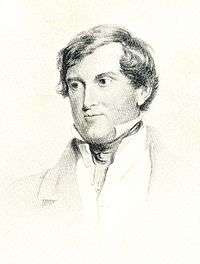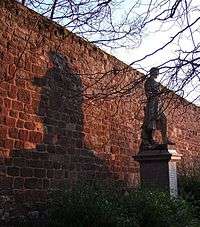Sir Thomas Dyke Acland, 10th Baronet
| Sir Thomas Dyke Acland, Bt | |
|---|---|
|
Sir Thomas Dyke Acland, 10th Baronet (1787-1871). 1844 marble bust by Edward Bowring Stephens. Collection of National Trust, Killerton House | |
| Born | 29 March 1787 |
| Died | 22 July 1871 (aged 84) |
| Title | Baronet of Columb John |
| Tenure | 17 May 1794 – 22 July 1871 |
| Predecessor | Thomas, 9th Baronet |
| Successor | Thomas, 11th Baronet |


Sir Thomas Dyke Acland, 10th Baronet (29 March 1787 – 22 July 1871) was a British politician and baronet.
Background
Born in London, he was the eldest son of Sir Thomas Dyke Acland, 9th Baronet and his wife Henrietta Anne Hoare, daughter of Sir Richard Hoare, 1st Baronet.[1] The Aclands were an old Devon family and successive generations of the family sat in the House of Commons for the county. His family had extensive properties on what is now the Holnicote Estate and particularly the village of Selworthy. In 1794, he succeeded his father as baronet. Acland was educated at Harrow School and Christ Church, Oxford and graduated with a Bachelor of Arts in 1808, and a Master of Arts in 1814.[1] He gained a Doctor of Civil Laws degree in 1831.[1]
Career
He was appointed High Sheriff of Devon for 1809–10. Although the Aclands were usually associated with the Liberal Party, this Acland was a Tory. He was the Member of Parliament (MP) for Devonshire from 1812 to 1818 and again from 1820 to 1831. He then sat for North Devon from 1837 to 1857.
Among his many business interests Acland was the owner of a schooner called Lady of St Kilda, which he bought in 1834. In 1842 the schooner visited the township of Melbourne in Australia, which had been founded in 1835. As a result of that visit, the suburb of St Kilda was named after the ship, and Acland St, one of St Kilda's main commercial centres, was named after Acland.
Family
In 1808, he married Lydia Hoare,[2] daughter of Henry Hoare.[1] A new baronetcy was created for his fourth son, Sir Henry Acland, 1st Baronet.
References
- 1 2 3 4 Dod, Robert P. (1860). The Peerage, Baronetage and Knightage of Great Britain and Ireland. London: Whitaker and Co. p. 82.
- ↑ "Lydia Elizabeth (née Hoare), Lady Acland". National Portrait Gallery, London.
- Thomas Dyke Acland, 10th baronet at thepeerage.com
- Thomas Dyke Acland, 10th baronet at Dyk.de
- Leigh Rayment's list of baronets
- Leigh Rayment's Historical List of MPs
External links
- Hansard 1803–2005: contributions in Parliament by Sir Thomas Dyke Acland
| Parliament of the United Kingdom | ||
|---|---|---|
| Preceded by Sir Lawrence Palk John Pollexfen Bastard |
Member of Parliament for Devon 1812 – 1818 With: John Pollexfen Bastard 1812–1816 Edmund Pollexfen Bastard 1816–1818 |
Succeeded by Edmund Pollexfen Bastard Hugh Fortescue |
| Preceded by Hugh Fortescue Edmund Pollexfen Bastard |
Member of Parliament for Devon 1820 – 1831 With: Edmund Pollexfen Bastard 1820–1830 Lord John Russell 1830–1831 |
Succeeded by Hugh Fortescue Lord John Russell |
| Preceded by Newton Fellowes Hugh Fortescue |
Member of Parliament for North Devon 1837 – 1857 With: Hugh Fortescue 1837–1839 Lewis Buck 1839–1857 |
Succeeded by James Wentworth Buller Charles Henry Rolle Trefusis |
| Baronetage of England | ||
| Preceded by Thomas Dyke Acland |
Baronet (of Columb John) 1794–1871 |
Succeeded by Thomas Dyke Acland |